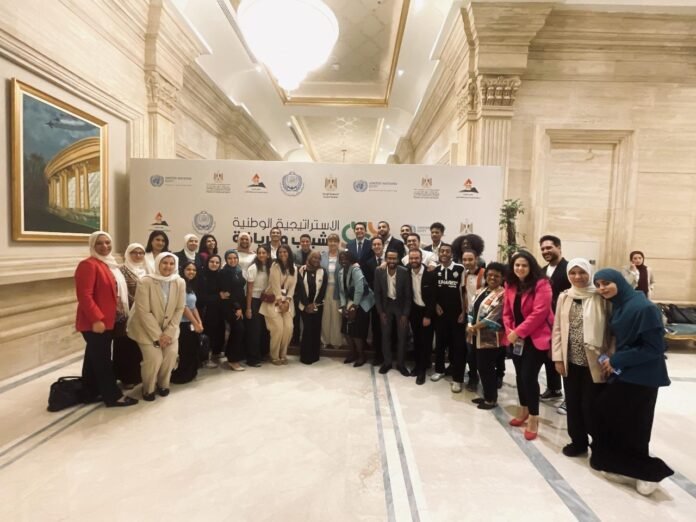The United Nations Resident Coordinator in Egypt, Elena Panova, said that the launch of the National Youth and Sports Strategy by the Ministry of Youth and Sports in Egypt reflects the Egyptian government’s interest in sports as a cultural force, a driver of national development, and a catalyst for empowerment, inclusion, and opportunity.
This came during the Ministry of Youth and Sports’ launch of the National Youth and Sports Strategy (2025-2032) at an event held in the New Administrative Capital under the patronage of Prime Minister Mostafa Madbouly, in partnership with the United Nations system in Egypt, coinciding with the celebration of International Youth Day on August 12.
During the event, Minister of Youth and Sports Dr. Ashraf Sobhi presented the new strategy, which aims to enhance youth and sports development by investing in human capital, supporting smart economic contributions, and achieving sustainable development.
The Role of Youth in Progress of Present

In her speech at the event, which was held with youth participation and attended by the Minister of Education and Technical Education, Mohamed Abdel Latif; Counselor Amal Ammar, President of the National Council for Women; UN Resident Coordinator, Elena Panova; UNFPA Representative in Egypt, Yves Sassenrath; and UNICEF Representative in Egypt, Natalia Winder-Rossi, Along with other representatives from ministries, UN agencies, and government entities, Panova said that sports in Egypt are a source of unity, identity, and ambition, which is reflected in the new strategy, which serves as a declaration of intent that confirms that Egypt sees its youth not only as the hope of tomorrow, but also as active contributors to the progress of the present.
She pointed out that, given that approximately 60% of Egypt’s population is under the age of 30, the country has tremendous demographic potential, and with it comes a responsibility to ensure that every young man and woman has the opportunity to learn, work, and prosper, enabling them to fully capitalize on this significant demographic dividend.
She explained that one powerful way to unleash this potential is through sports as a source of unity, identity, and ambition, which is embodied in Egypt’s National Youth and Sports Strategy.
Panova pointed out that what distinguishes this strategy is the way it was formulated, through a comprehensive national dialogue led by the Ministry of Youth and Sports. This included more than 21 workshops in 11 cities, a survey of the opinions of more than 10,000 young men and women, and more than 400 proposed practical measures.
“These are policies made with young people, not just for young people,” she said. “They build on the strong partnership between the United Nations and the Government of Egypt to ensure that young people’s voices are not only heard but acted upon”.
The UN Resident Coordinator in Egypt explained that the UN system in Egypt believes that the genuine, diverse, and effective participation of youth—both within and outside the UN—is essential to achieving the Sustainable Development Goals.
She pointed to the “Shabab Balad” initiative, through which Egypt participates in the UN’s global “Generation Unlimited” initiative, which aims to connect every young man and woman to education, employment, and empowerment. She also referred to the UN Youth Advisory Council in Egypt, through which the UN system seeks to ensure the effective contribution of young women and men in formulating UN strategies, programs, and resolutions at all levels.
Cooperation between the United Nations and Egypt
Panova emphasized that the United Nations’ priorities for youth are closely linked to Egypt’s national vision for its youth. Joint work between the Egyptian government and the United Nations system focuses on skills development, decent work, and community engagement, and extends to digital innovation.
The UN official reviewed some of the results of this joint effort, explaining that in 2024 alone, more than 364,000 people—mostly young people—acquired new skills through UN-supported programs. She also noted that community coaching initiatives empower young women to become local leaders in sports and social innovation. Across Egypt, young entrepreneurs are leading green growth projects, ranging from agribusiness to green-smart projects.
Panova reiterated the United Nations’ commitment to working with the Egyptian government and all partners for and with young people, ensuring that our collective actions are informed by their voices and energy.
The new strategy is based on four main pillars that prioritize the comprehensive development of youth and adolescents, promoting a culture of sports as a way of life, developing competitive and creative sports, and improving governance in the youth and sports sectors.


